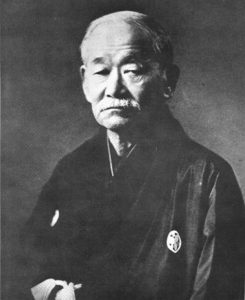The Kanō Chronicles: The Untold History of Modern Japan® (嘉納歴代史:知らず近代日本史®) is the result of over 15 years of research into the life and times of Kanō Jigorō, 嘉納治五郎 (1860-1938), the founder of jûdô 柔道. In traditional jūdō texts and by today’s jūdōka 柔道家 (judo practitioners) he is normally addressed as ‘Kano shihan’ 師範 (Master Kano).*
No English or Japanese language biographies of Kano shihan capture the complexity of the man and his times. Even the best Japanese biographies are often narrow, typically focused on Kano’s jūdō, education, sports, or Olympic activities, or some combination thereof. There are exceptions, but they are rare and difficult to digest, even for native Japanese, and have escaped the attention of Western researchers.
Context is important, and detailed historical context is not part of Western biographies of Kano. One example can be seen below, in a rare English explanation by Kano shihan of the ‘True Spirit of Judo’.
When I was still young, I learned various types of “jujitsu”.** However, I found it difficult to discover the fundamental principles that decide as to which is the correct method because the teaching of each type was different. Thereupon, in order that I might find out the fundamental principle somehow or other, I began to study seriously. And, in the course of time, I was able to succeed in discovering it. What is this fundamental principle? It is to let our spirit and bodies work most effectively in order to accomplish our purpose, whenever we wish to throw others down, or cut, push, or kick others.
— Kano Jigoro, ‘True Spirit of Judo’, 1938
Rather than the ‘true spirit of jūdō’, a more complete context of the article reveals this to be only the lowest, simplest definition of jūdō espoused by Kanō shihan, meant only as the beginning of a much more complex discussion. As the rest of his discussion is thought not pertinent to today’s sports judo, it is typically discarded, thus lost to generations of judoka who are left with the notion that the epitome of his philosophy is physically controlling your opponent effectively.
Nothing could be further from the truth.
The Kanō Chronicles™ provides the history of Kanō shihan in the context of his times. He lived in a unique period of history, namely the development of Japan from an isolated, feudal backwater to one of the largest empires in history. His patrons, peers, and pupils included princes, prime ministers, politicians, philosophers, prophets, priests, political puppet masters, puppeteers, paupers, oligarchs, generals, admirals, academics, assassins, the assassinated, mandarins, revolutionaries, counterrevolutionaries, reactionaries, samurai, spies, spy masters, sumotori, strike breakers, chancellors, commoners, Christians, Chinese, Confucianists, Communists, women and Class A war criminals.
Kanō shihan personally participated in the initial formation and subsequent reforms of Japan’s education, language, sports, ethics, teacher and moral training, indeed the development and dissemination of its very culture. He thus left an indelible mark on the nation, indeed much of the Empire through the education of thousands of teachers, judoka and their millions of students.
********
* In keeping with the tradition, Japanese names are given in the order LastName FirstName. Note that in the era under study, Japanese often changed their first / given names in recognition of phases or changes in their lives; becoming an adult, reaching 60 years of age, or at any age to designate some eventful political or personal event. Sometimes, frequently; sometimes, in accordance with the stages of life, or simply whimsically. Some phases were chronological: 50, 60, 70, or 80 years old. Nicknames or pen names if known are given in single quotes, ala ‘Konan’, Kano shihan’s penname for calligraphy until his 60th birthday.
** The transliteration of Japanese into Western characters has changed over more than 100 years of use to settle on the current system. This site and associated works use older, nonstandard terms such as jujitsu, jiujutsu, jiudo, Kodokwan, etc. only in direct quotations. Today the rendering of these Japanese terms in Roman letters is unequivocal and universal; judo, jujutsu, Kodokan, etc.
Lance Gatling
Author / Lecturer
The Kanō Chronicles
Tokyo, Japan
Contact@kanochronicles.com – please send a note to give us feedback.
Thank you!
